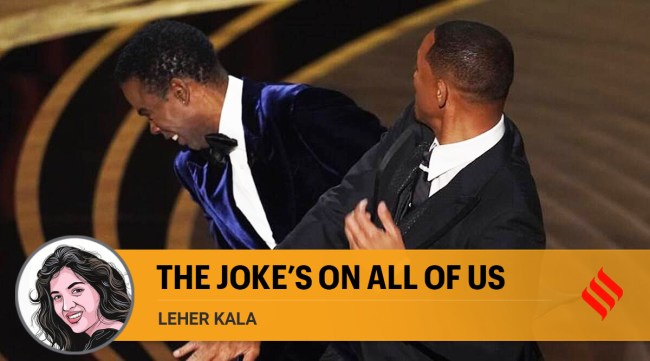Opinion The joke’s on all of us
The world was stunned when actor Will Smith nonchalantly climbed the Oscars stage and punched host Chris Rock last week. Smith went on to win an Oscar and dance the night away, the lack of consequences alarming for whacking someone with billions watching.
 Will Smith, right, hits presenter Chris Rock on stage while presenting the award for best documentary feature at the Oscars on Sunday, March 27, 2022, at the Dolby Theatre in Los Angeles. (AP Photo)
Will Smith, right, hits presenter Chris Rock on stage while presenting the award for best documentary feature at the Oscars on Sunday, March 27, 2022, at the Dolby Theatre in Los Angeles. (AP Photo) It is some consolation that it’s not just comedians in India who need to worry about getting beaten up for a bad joke. The world was stunned when actor Will Smith nonchalantly climbed the Oscars stage and punched host Chris Rock last week. Smith went on to win an Oscar and dance the night away, the lack of consequences alarming for whacking someone with billions watching. There were plenty of others who deserved to be celebrated that night but the narrative of the Academy Awards 2022 was hijacked by the slap — another unfortunate example of how viral culture is perpetually overshadowing important achievements.
For thousands of years, mankind has settled all kinds of disputes by blows. Violence has been part and parcel of the human experience since time immemorial. If it were the 17th or 18th Century in England, this particular Oscar debacle would have been settled by a duel — an arranged combat with matched weapons (where Smith wouldn’t have had the critical advantage of surprise). Duels took place under strict rules, the idea being to respect those willing to risk their lives to regain lost honour.
The human mind is most fertile when it comes to conjuring ways to humiliate alleged transgressors; even today, after every highly publicised rape in Delhi it’s common to hear people opine that rapists should be hung somewhere central, where onlookers can stone them. Human beings are innately violent, so even in the 21st Century, an autocrat can get away with bombing a neighbouring country into oblivion, while the rest of us watch on helplessly.
For whatever it’s worth, we still (outwardly) abhor erratic behaviour — society places a premium on the cultivated art of politeness — which is why Smith’s expletive-ridden outburst has created a furore.
Right or wrong, the unwritten rules of etiquette demand we hide our anger, no matter what the provocation. Recently I found myself on a long road journey with three people I like but whose political opinions I disagree with. Over eight tedious hours, I could feel my blood pressure rising wildly and ebbing repeatedly. It would be a lie if I didn’t admit it crossed my mind how nice it would be if I could just box them, and make them shut up.
That’s the thing about freedom of speech; we all support it, till we hear things we don’t like. The sage Jiddu Krishnamurti noted, to observe without judgment is the highest form of intelligence; people who can manage that are rare and wholly deserving of a halo around their heads.
The main takeaway from the Smith fiasco is that absolutely nobody is free of grave imperfections; scratch the surface and it’s evident, no one’s leading a dream life either. We tend to view Hollywood legends as earthlings inhabiting a rarefied stratosphere where nothing bad ever happens, but success, it turns out, is no protection from petty emotions and fits of rage. There will be moments in all our lives that we deeply regret irrespective of what we have achieved.
Meanwhile, consider the plight of the beleaguered comedian left wondering where, exactly, is that imaginary line between hilarity and insult that must never be crossed. Political correctness and cancel culture have doomed humour; it’s not just stand-up comics, we must all tread gingerly for fear of being accused as insensitive towards the disadvantaged. The fact is, people are an entangled mess of hopeless contradictions. Surely, it’s possible to laugh at an inappropriate sexist joke, yet uphold values of equality and feminism.
It’s impossible to explain why we find what we find funny. The best jokes take a serious issue, twist it around and expose the absurdities around it, cleverly stripping injustice, or tragedy, of its power. It doesn’t seem that terminal illness could have any connection with comedy but there is a whole sub genre of cancer humour available online, with patients laughing the loudest. Sometimes, rather, when everything else fails, laughter is the best medicine. Comedy is subjective. Not everyone is going to like a particular joke. Crucially, just because somebody is offended, doesn’t mean they’re right.
(The writer is director, Hutkay Films)




